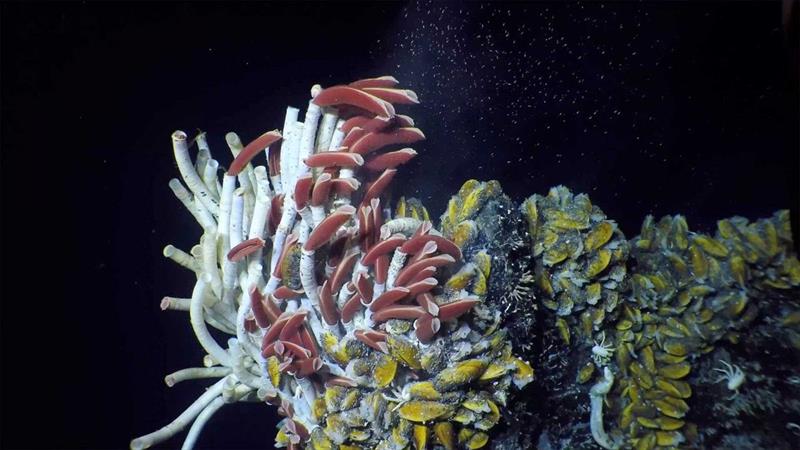
Scientists call for decade of concerted effort to improve understanding of the deep ocean
by The Woods Hole Oceanographic Institution 30 Nov 2020 06:15 UTC

Tubeworms © Courtesy of Jason Sylvan, Texas A&M Univ./NSF/HOV Alvin/2019/WHOI
The deep ocean - vast expanses of water and seafloor more than 200 meters (660 feet) below the surface - are globally recognized as an important frontier of exploration and research.
Despite the fact they account for nearly two-thirds of Earth's surface area, however, very little is known about them, the ecosystems and life they support, and their impact on the health of the entire planet.
Now an international team of scientists representing 45 institutions, including the Woods Hole Oceanographic Institution (WHOI), and spanning 6 continents and 17 nations has called for a dedicated, decade-long program of research to greatly advance knowledge about these remote and, in many cases, entirely unexplored regions.
Scientists have named this initiative Challenger 150 to mark the 150th anniversary of the Challenger Expedition, the first modern oceanographic expedition that departed from Plymouth, U.K., in 1872. A century and a half later, the new program is timed to coincide with the United Nations Decade of Ocean Science for Sustainable Development that runs from 2021-2030.
Among its key aims would be to build greater capacity and diversity within the ocean science community, especially in light of the fact that existing deep-sea research is conducted primarily by scientists and institutions from developed nations.
It would also generate greater physical, biogeochemical, and biological data through the application of new and existing technology, and use those data to advance understanding of how changes in the deep seas impact the wider oceans and the rest of the planet.
The program would also look to use this new knowledge to support regional, national, and international decision-making on issues such as deep-sea mining, fishing, and conservation.
The rationale behind the call for action is presented in two articles being published simultaneously in top-tier research journals: a comment article in Nature Ecology and Evolution and a full blueprint of the program in Frontiers in Marine Science.
Led by Kerry Howell, Professor of Deep-Sea Ecology at the University of Plymouth (UK) and Ana Hilario, Researcher at the University of Aveiro (Portugal), the authors include female and male scientists from both developed and developing nations on six of the world's seven continents.
"The deep ocean represents one of the last unexplored and untapped frontiers on Earth," said WHOI Senior Scientist Chris German, who has been helping to shape the program since 2018. "Our deep oceans represent the largest habitat for life on Earth, but also remains the least understood. To sustainability manage this important food and mineral resource, we need to massively expand our ability to explore and understand. Just like the original Challenger Expedition in its day, this effort will demand new innovation and implementation of previously only dreamed-of tools. Pushing the limits of our technology to expand our knowledge of the planet will not only make us better stewards of our home planet, it will also set the stage for us to reach out, in future, and search for life beyond Earth in the newly discovered depths of other ocean worlds."
For more information, please visit www.whoi.edu.
This article has been provided by the courtesy of Woods Hole Oceanographic Institution.